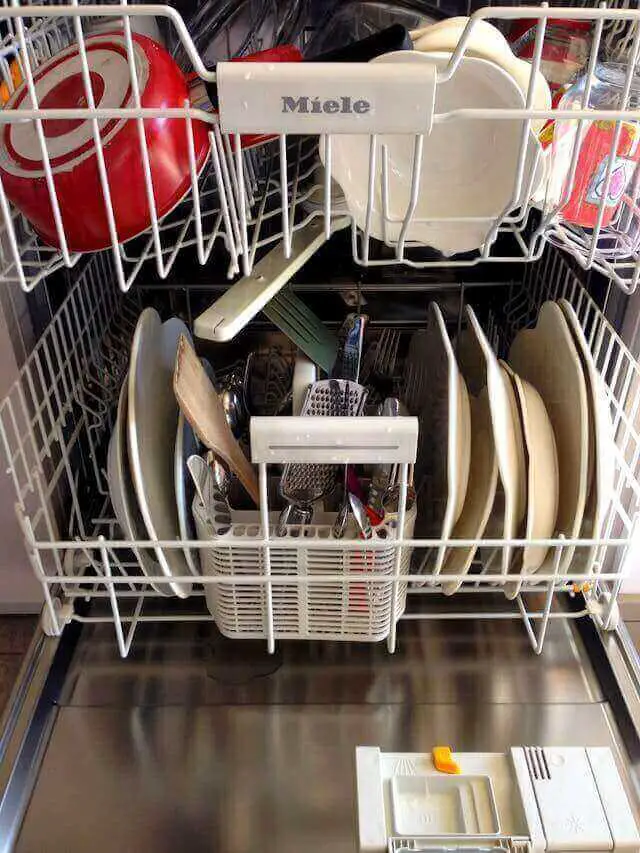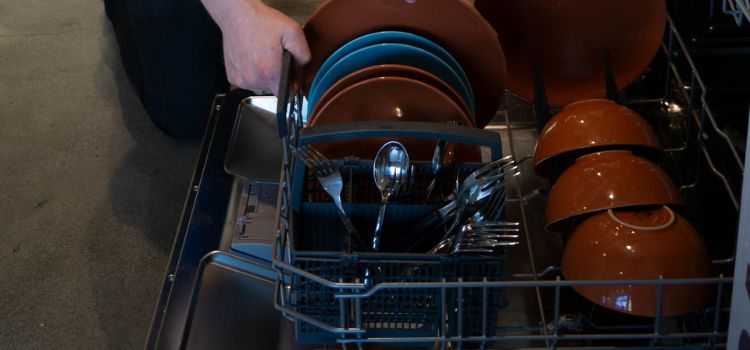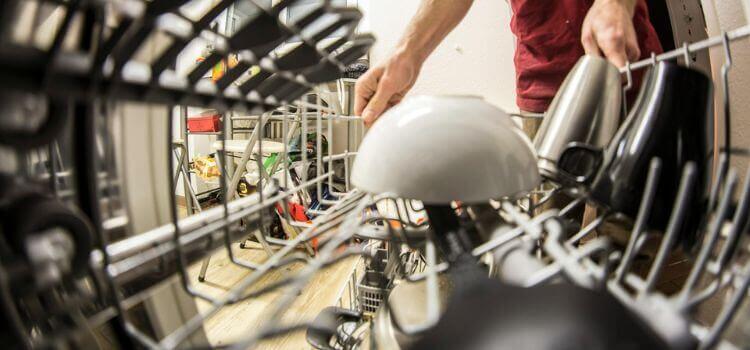When investing in a dishwasher, it’s essential to consider durability and long-term reliability. Ensuring proper care and maintenance can help maximize the lifespan of your dishwasher, saving you money and hassle in the long run. Regularly cleaning the filter, checking for leaks, and using dishwasher-safe detergent are simple steps to extend its longevity.
Additionally, following manufacturer’s guidelines for maintenance and repairs can prevent premature breakdowns and ensure efficient performance. By taking proactive measures, you can enjoy the convenience of your dishwasher for many years to come.
Dishwashers typically last around 9-12 years. Factors like usage frequency and maintenance can influence lifespan.

Factors That Affect Lifespan Of Dishwashers
Factors such as usage frequency, maintenance, and quality of parts can impact the lifespan of dishwashers. Regular cleaning and proper care can help extend their longevity.
Factors That Affect Lifespan of Dishwashers When considering the longevity of a dishwasher, several factors come into play. It’s important to understand the elements that impact the lifespan of a dishwasher to ensure its optimal performance and durability. Let’s explore these factors in detail:
- Build Quality: High-quality materials and robust construction significantly impact the lifespan of a dishwasher. Stainless steel interiors and durable components contribute to longevity.
- Usage Frequency: Frequent use can lead to wear and tear. The frequency at which a dishwasher is used affects its overall lifespan. Overuse may result in the need for repairs or replacements.
- Maintenance: Regular maintenance, such as cleaning filters, checking for leaks, and servicing components, can extend the lifespan of a dishwasher. Proper care and timely repairs are vital.
- Water Quality: Hard water deposits can affect the internal mechanisms of a dishwasher, potentially shortening its lifespan. Quality of water used in the dishwasher is essential in maintaining its longevity.
- Detergent Quality: Using a high-quality detergent that is suitable for the dishwasher model can prevent the accumulation of residue and prolong its lifespan. In summary, the lifespan of a dishwasher is influenced by factors such as build quality, usage frequency, maintenance, water quality, and detergent quality. Understanding and addressing these factors can contribute to maximizing the longevity of a dishwasher.
Average Lifespan Of Dishwashers
Dishwashers generally last around 9-12 years, with proper maintenance and usage habits. Factors like brand, quality, and maintenance routines can influence the lifespan of your dishwasher. Regular cleaning and servicing can help extend the longevity of your appliance.
Average Lifespan of Dishwashers Manufacturer’s Claims Manufacturers typically claim that dishwashers have an average lifespan of 9 to 12 years under normal usage conditions. Consumer Reports According to Consumer Reports, the estimated lifespan of a dishwasher is typically between 7 to 12 years, with many newer models lasting even longer due to advancements in technology and materials. Industry Expert Opinions Industry experts suggest that with proper maintenance and care, dishwashers can last up to 10 to 15 years, especially if they are high-quality models from reputable brands. When it comes to the average lifespan of dishwashers, it’s important to consider various factors such as usage frequency, maintenance, and quality of the appliance. Despite manufacturer claims, consumer reports and industry expert opinions indicate that the lifespan of dishwashers can vary. It’s essential for consumers to consider these factors when purchasing a dishwasher to ensure they get the best possible lifespan out of their investment.
Signs Of A Failing Dishwasher
Signs of a failing dishwasher include poor cleaning results, leaking water, strange noises, and unusual odors. Regular maintenance can help extend the lifespan of a dishwasher.
- Leaking: A noticeable pool of water under the dishwasher indicates a potential leak.
- Unusual Noises: Loud grinding or knocking noises during the wash cycle can indicate a problem.
- Failure To Clean Properly: Dishes coming out dirty even after multiple wash cycles may signal a failing dishwasher.
- Inefficiency: If the dishes are consistently wet or the cycle takes longer than usual, the dishwasher may be inefficient.
- Electrical Problems: Frequent power surges or lights flickering when the dishwasher runs point to electrical issues.
How To Extend The Lifespan Of Your Dishwasher
To extend the lifespan of your dishwasher, follow proper maintenance like cleaning the filter, avoiding overloading, using the right detergent, and regularly checking for leaks or unusual noises. Periodically inspect the hoses and ensure proper installation to maximize the lifespan of the appliance.
Proper Loading And Unloading
Proper loading and unloading of your dishwasher can significantly extend its lifespan. By following a few simple guidelines, you can ensure that your dishwasher operates efficiently and effectively for years to come.
When loading your dishwasher, make sure to evenly distribute the weight of the dishes. This prevents the dishwasher from becoming imbalanced and reduces the risk of damage to the internal components. Additionally, avoid overcrowding the dishwasher by leaving enough space between dishes for water and detergent to circulate.
When unloading your dishwasher, be gentle with the racks and carefully remove each item. Avoid using excessive force or pulling on the racks, as this can cause them to become misaligned or damaged. By practicing proper loading and unloading techniques, you can keep your dishwasher running smoothly and avoid costly repairs.
Regular Cleaning
Maintaining a clean dishwasher is essential for extending its lifespan. Over time, food particles, grease, and soap scum can build up inside the dishwasher, leading to clogs and reduced performance. By regularly cleaning your dishwasher, you can prevent these issues and keep your appliance in top condition.
To clean your dishwasher, start by removing any debris from the filter or drain. Then, use a mixture of vinegar and baking soda to remove stubborn stains and odors. Run an empty cycle with this solution to thoroughly clean the interior of the dishwasher. Additionally, wipe down the rubber gasket and door seals regularly to prevent the growth of mold and mildew.
By incorporating regular cleaning into your maintenance routine, you can extend the lifespan of your dishwasher and ensure that it continues to provide sparkling clean dishes for years to come.
Replacing Worn Parts
Over time, certain parts of your dishwasher may wear out and need to be replaced. Paying attention to the condition of these components and replacing them promptly can help prolong the lifespan of your dishwasher.
One common component that may require replacement is the dishwasher rack. Over time, the coating on the rack can become chipped or damaged, leading to rust and potential damage to your dishes. If you notice any signs of wear or rust on the rack, it is important to replace it as soon as possible.
Other parts that may need replacement include the dishwasher spray arm, heating element, and door latch. If you notice any unusual noises, leaks, or issues with the cleaning performance of your dishwasher, it may be a sign that one of these parts needs to be replaced. By addressing these issues promptly, you can avoid further damage and extend the lifespan of your dishwasher.
Avoiding Overloading
While it may be tempting to fit as many dishes as possible into your dishwasher, overloading can put unnecessary strain on the appliance and reduce its lifespan. By avoiding overloading, you can ensure that your dishwasher operates efficiently and effectively.
- Allow adequate room between dishes so that detergent and water may flow freely.
- Avoid stacking dishes on top of each other, as this can prevent proper cleaning and drying.
- Don’t overload the silverware basket or utensil rack to prevent tangling and improve cleaning performance.
- Follow the manufacturer’s guidelines for maximum capacity to avoid overloading your dishwasher.
Using The Right Detergent
Using the right detergent is essential for maintaining the performance and lifespan of your dishwasher. It is important to use a high-quality dishwasher detergent that is specifically designed for use in automatic dishwashers.
Follow these tips to ensure proper detergent usage:
- Read the manufacturer’s instructions to determine the proper amount of detergent to use.
- Avoid using excessive amounts of detergent, as this can lead to residue buildup and reduced cleaning performance.
- Choose a detergent that is suitable for your water hardness level, as hard water can affect the effectiveness of the detergent.
- If you notice any residue or spots on your dishes after a wash cycle, consider switching to a different detergent or adjusting the amount you use.
By using the right detergent and following these guidelines, you can ensure that your dishwasher operates efficiently and enjoy its benefits for many years.

Benefits Of Upgrading To A Newer Dishwasher
When it comes to upgrading your kitchen appliances, one often overlooked but crucial element is the dishwasher. Investing in a newer dishwasher can bring a myriad of benefits that go beyond just the convenience of a modern appliance. From improved energy efficiency to advanced features, warranty coverage, and water and money savings, upgrading to a newer dishwasher can have a significant impact on your daily life and household expenses.
Improved Energy Efficiency
Newer dishwashers are designed with advanced energy-saving technologies, resulting in lower electricity consumption. By upgrading to a newer model, you can significantly reduce your carbon footprint while cutting down on your utility bills. The improved energy efficiency of modern dishwashers translates to sustainable living and cost savings over time.
Advanced Features
Upgrading to a newer dishwasher means gaining access to a range of advanced features that enhance the overall dishwashing experience. From customizable wash cycles to adjustable racks and specialized cleaning modes, modern dishwashers are equipped with innovative functionalities that make dishwashing more efficient and tailored to your specific needs. These advanced features ensure a thorough and personalized cleaning performance every time.
Warranty Coverage
Investing in a new dishwasher provides you with the added benefit of warranty coverage, offering peace of mind and protection against potential malfunctions or issues. Many manufacturers offer extended warranties for newer models, safeguarding your investment and providing reliable support in the event of any operational concerns or maintenance requirements.
Water And Money Savings
Newer dishwashers are engineered with water-saving technologies that reduce the overall water consumption during each cycle. By upgrading to a more efficient model, you can contribute to water conservation efforts while lowering your monthly water bills. Additionally, the enhanced cleaning performance of modern dishwashers ensures optimal results with less water usage, further translating into long-term cost savings for your household.
When To Consider Repairing Or Replacing Your Dishwasher
- Cost Of Repairs: If the cost of repairs exceeds 50% of the price of a new dishwasher, it may be more financially beneficial to opt for a replacement.
- Age Of The Dishwasher: Consider the age of your dishwasher. Typically, dishwashers have a lifespan of 9-15 years. If your appliance is close to or exceeds this timeframe, it may be wise to replace it rather than invest in repairs.
- Availability Of Parts: Obsolete parts can present a significant challenge when attempting to repair an older dishwasher. It may often be difficult to find the necessary components, making a replacement a more feasible option.
- Persistent Issues: Persistent issues, such as leaks, inconsistent cleaning, or loud noises, are indications that your dishwasher may be approaching the end of its lifespan. Continual problems may signal that it’s time for a replacement.
Common Dishwasher Issues And Troubleshooting
Common dishwasher issues can be frustrating, but with some troubleshooting, you may be able to solve them without calling for professional assistance. Let’s take a look at some typical problems and their potential solutions.
Dishes Not Drying
If your dishwasher isn’t drying dishes properly, the heating element or the rinse aid dispenser could be the culprit. Check the heating element for damage and ensure the rinse aid dispenser is full and functioning. Additionally, make sure the water temperature is adequate and that you are using a high-quality rinse aid to promote drying.
Clogged Spray Arms
A common issue that can affect the performance of your dishwasher is clogged spray arms. Check the spray arms for obstructions and clean out any debris if needed. Ensure that the holes in the spray arms are clear, and run a cleaning cycle with a dishwasher cleaner to eliminate any built-up residue.
Foul Odors
Foul odors coming from your dishwasher can be a result of food particles and grease accumulating in the unit. To remedy this, clean the filter, check the drain for clogs, and run a hot water cycle with vinegar or a dishwasher cleaner to eliminate any lingering odors.
Door Not Latching
If your dishwasher door isn’t latching properly, it can lead to leaks and inefficient operation. Check for any obstructions around the door, and ensure that the latch mechanism is aligned and functioning correctly. Sometimes, simple adjustments or replacements of the door latch or gasket may be required.
Error Codes
When error codes appear on your dishwasher’s display, they can indicate various issues such as water inlet problems, drain pump issues, or sensor malfunctions. Refer to the manufacturer’s manual to identify the specific error code and follow the recommended troubleshooting steps to address the underlying problem.
Proper Maintenance Techniques For Dishwashers
Proper maintenance techniques are essential to ensure the longevity and efficient functioning of your dishwasher. By incorporating these simple yet effective steps into your regular maintenance routine, you can prolong the lifespan of your appliance and keep it running smoothly for years to come.
Cleaning The Filter
Regularly cleaning the filter of your dishwasher is crucial to prevent food particles and debris from clogging the system and affecting its performance. Remove the filter and rinse it under running water to dislodge any trapped residue. For a more thorough clean, soak the filter in a solution of warm water and mild detergent, then rinse and reinstall.
Dealing With Hard Water Deposits
Hard water deposits can build up over time, causing scaling and reduced efficiency in your dishwasher. Use a specialized dishwasher cleaner or run a cycle with white vinegar to dissolve and remove these deposits. This simple step can help maintain the interior components and ensure optimal performance.
Inspecting And Cleaning The Spray Arms
Regularly inspecting and cleaning the spray arms is essential to keep them free from obstructions. Remove any debris or buildup from the spray arm nozzles to maintain proper water circulation and ensure dishes are thoroughly cleaned during each cycle.
Checking The Door Seal
Ensure the door seal of your dishwasher is clean and free from any cracks or damage. A tight seal is crucial for efficient operation, preventing leaks and maintaining the internal temperature for effective cleaning. Wipe the seal with a damp cloth to remove any debris and inspect it for any signs of wear or tear.
Keeping The Interior Clean
Regularly wipe down the interior of the dishwasher to remove any food particles, grease, or residue that may accumulate. Use a mild detergent and a soft cloth to clean the interior walls and door, ensuring a hygienic environment and preventing any potential odors or buildup.
Environmental Impact Of Dishwashers
The Environmental Impact of Dishwashers is an important consideration as we strive towards sustainable living practices.
- Water Usage: Dishwashers typically use less water than washing dishes by hand, conserving valuable water resources.
- Energy Consumption: Modern dishwashers are designed for energy efficiency, lowering overall electricity consumption.
- Detergent And Chemicals: Using eco-friendly detergents and chemical-free cleaning agents helps minimize environmental harm.
- E-waste Concerns: Proper disposal of old dishwashers is crucial to prevent e-waste buildup, promoting a cleaner environment.

Credit: discover.texasrealfood.com
Choosing The Right Dishwasher For Longevity
Discover the key factors affecting dishwasher longevity, including performance, maintenance, and quality construction. Gain insights on how to choose a dishwasher that can last for a decade or longer, maximizing your investment in a durable and efficient appliance.
Researching Brands And Models
When it comes to choosing a dishwasher that will last, it’s important to start by researching different brands and models. Not all dishwashers are built the same, and some brands have a reputation for producing appliances that stand the test of time. By researching various brands, you can find out which ones are known for their durability and reliability.
One way to research different brands is by reading customer reviews and ratings. This will give you an idea of how satisfied customers are with their dishwasher purchase and how long the appliance has lasted for them. It’s important to consider the overall consensus of reviews rather than focusing on one or two negative experiences.
Reading Consumer Reviews
Consumer reviews can provide valuable insights into the longevity of a dishwasher. By reading these reviews, you can get a sense of any common issues or recurring problems that customers have experienced with a particular brand or model. Look for patterns in the feedback, as this can indicate potential reliability issues or strengths.
Pay attention to reviews that mention how long the dishwasher has lasted for the consumer. If you consistently come across reviews that state the dishwasher started malfunctioning or breaking down after only a year or two, it’s a red flag that the appliance may not be built to last. On the other hand, if you find many reviews from satisfied customers who have had their dishwasher for several years without any major issues, it suggests a higher likelihood of longevity.
Considering Additional Features
While longevity is a key consideration when choosing a dishwasher, it’s also worth thinking about the additional features that different models offer. Modern dishwashers come with a range of features designed to enhance the cleaning process and improve efficiency.
Some popular additional features to consider include adjustable racks, specialized wash cycles for delicate items or heavy-duty cleaning, and built-in water softeners. These features can make your dishwasher more versatile and efficient, but it’s important to choose options that align with your specific needs and preferences.
Energy Star Ratings
In addition to researching brands, reading reviews, and considering additional features, paying attention to Energy Star ratings can also help you choose a dishwasher that will last. Dishwashers with an Energy Star certification are designed to meet strict energy efficiency guidelines, which can save you money on utility bills and reduce your environmental impact.
Energy Star-rated dishwashers are built to be more efficient in terms of water and electricity usage. This not only benefits the environment but also indicates that the dishwasher is likely to be well-engineered and built to last. The certification serves as an assurance of quality and longevity, making it a valuable consideration.
Future Trends In Dishwasher Technology
In recent years, dishwasher technology has seen remarkable advancements, which have transformed these household appliances into efficient and intelligent machines. With smart home integration becoming a common feature, dishwashers are now more than just a convenient way to wash and sanitize dishes. Future trends in dishwasher technology focus on four key areas: smart home integration, improved cleaning performance, increased energy efficiency, and enhanced connectivity. Let’s check each of these noteworthy advancements in more detail:
Smart Home Integration
One of the most significant advancements in dishwasher technology is the incorporation of smart home integration. Modern dishwashers now seamlessly integrate with smart home systems, allowing homeowners to control and monitor their dishwasher’s settings remotely. Through voice commands or smartphone apps, you can conveniently start, stop, or adjust the dishwasher’s operations from anywhere in your home. This level of connectivity not only enhances convenience but also provides real-time updates on the cleaning process, ensuring you never miss a beat.
Improved Cleaning Performance
Thanks to ongoing research and development, dishwasher manufacturers continue to make significant strides in improving cleaning performance. The latest dishwashers employ cutting-edge technologies such as high-pressure jets, advanced filtration systems, and targeted water sprays, ensuring even the toughest stains and stuck-on food particles are effortlessly removed. Additionally, many dishwashers now feature specialized cleaning cycles for delicate glassware, heavily soiled pots and pans, and quick wash options, allowing you to optimize the cleaning process based on your specific needs.
Increased Energy Efficiency
As energy conservation becomes increasingly important, dishwasher manufacturers are prioritizing energy efficiency in their designs. Modern dishwashers incorporate innovative features such as sensors that adjust water and energy usage based on the load size, programmable delay start options to optimize energy consumption during off-peak hours, and enhanced insulation to retain heat, reducing the need for excessive energy use. These advancements not only help save on utility bills but also contribute to a greener and more sustainable environment.
Enhanced Connectivity
The future of dishwashers lies in enhanced connectivity, which goes beyond just integration with smart home systems. Dishwashers equipped with Wi-Fi capabilities allow for seamless communication with other connected appliances in your kitchen, creating a synchronized and efficient kitchen environment. For example, your dishwasher can communicate with your smart refrigerator, automatically adjusting its cleaning cycle based on the items you’ve loaded, while also updating your shopping list with any missing ingredients. This level of connectivity not only streamlines your day-to-day tasks but also optimizes resources, saving you time and effort in managing your kitchen efficiently.
Frequently Asked Questions On How Long Do Dishwashers Last
How Often Should You Replace A Dishwasher?
It is generally recommended to replace a dishwasher every 10-12 years.
Is It Worth It To Fix A Dishwasher?
Repairing a dishwasher is usually worth it if the cost is less than half of a new one.
How Long Do Dishwashers Last By Brand?
Dishwashers last about 9-10 years on average. Bosch, Miele, and KitchenAid are known for longevity.
How Do You Know When Your Dishwasher Needs To Be Replaced?
Your dishwasher may need replacement if it’s constantly malfunctioning or not cleaning dishes properly. Other signs include excessive noise, leaks, or a broken door latch. If repairs are more costly than a new dishwasher, or if it’s more than 10 years old, consider replacing it.
Conclusion
Ultimately, understanding the lifespan of dishwashers can help you make informed decisions. Regular maintenance and proper usage can significantly prolong their durability. Remember to consider various factors like brand quality and usage frequency. Knowing the lifespan of your dishwasher can save you time, money, and hassle in the long run.
As an Amazon Associate, I earn from qualifying purchases

